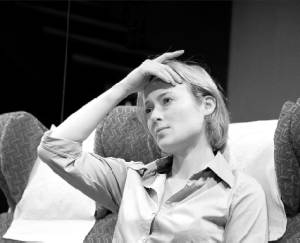
Jennifer Ehle as Annie: a genuinely inner performance, her very smiles can
express melancholy or disappointment
Photograph: Donald Cooper
from the London Times, 6/3/99
by Benedict Nightingale
Until his Real Thing hit London in 1982 Tom Stoppard could be categorised as an intellectual trapezist, a metaphysical clown, a juggler with words - a very funny, clever fellow. You could not imagine his people raging, howling, or even hurting. Their dark nights of the soul never amounted to more than a rueful tristesse.
Then came The Real Thing, to be followed at regrettably long distances by Arcadia and The Invention of Love; and it was increasingly clear that Tom had a heart as well as a head and was prepared to expose it. And that's justification enough for the play's first major production in 17 years.
How does David Leveaux's revival reward the scrutiny? With Stephen Dillane as Henry, a dramatist seemingly as urbane as Stoppard himself, and Jennifer Ehle as Annie, the actress originally played by Felicity Kendal, the evening makes up in serious feeling what it lacks in energy. When they first show their love, or when their subsequent marriage is tested by her adultery, their bond's quiet intensity is unmissable.
The evening starts deceptively. A wife claims to be returning from Geneva to a husband who knows she has been with her lover. The exchanges seem vintage Stoppard: "Franc doing well?", "Frank who?", "The Swiss franc." But this is an extract from Henry's latest West End success, and the point of The Real Thing itself is to repudiate its blandness. When Annie admits her affair with Henry to her first husband, and later, when she makes her parallel confession to Henry, the men's reaction is far from urbane: it's an abject "don't, please don't".
Don't run away with the notion that The Real Thing is wholly sombre. It contains lines as comical as any Stoppard has written. And don't get the idea that it lacks his trademark curiosity and mental agility. You are invited to inspect its topics from shifting points of view. There are even extracts from Miss Julie and 'Tis Pity She's a Whore, two plays about the perils of that commodity Henry defines as "mess, pain, self-abasement, loss of self-respect, nakedness" and his adolescent daughter as "colonisation": love.
There's also a sub-plot involving a soldier who has been gaoled for violently protesting against the Bomb. With Annie's encouragement he writes a a plodding, didactic play that Henry despises yet agrees to make actable in order to please her. This seems irrelevant, but isn't. Here, everywhere, the heart rather than the head finally determines the characters' behaviour. There is a "real thing", and it is feeling, caring and being vulnerable.
At times I wondered if Ehle might try to be steamy as well as creamy and dreamy. Yet hers is a genuinely inner performance, whose very smiles can express melancholy or disappointment. And Dillane matches her for subtlety. He has a dry, droll charisma, a doleful humour, and a sense of irony that reaches to his toes; but you know that beneath the elegance of mind there are hidden darknesses. Has Stoppard written a more introspective and maybe self-revealing play than The Real Thing? I don't think so.
Back to The Real Thing Article Index